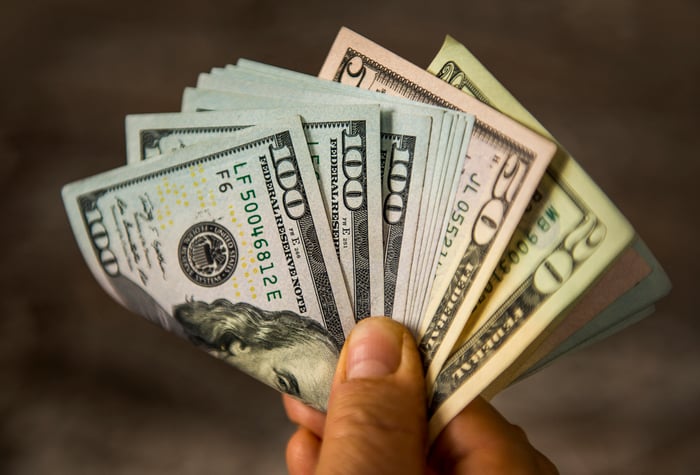There are a lot of investing strategies that can make you money on Wall Street. Buying dividend stocks tends to be one of the smartest and safest ways to grow your wealth.
Publicly traded companies that pay a regular dividend are usually profitable, offer transparent long-term growth outlooks, and are time-tested. In other words, they're businesses that have demonstrated their staying power to investors through thick and thin.
Furthermore, income stocks have handily outperformed over the long run. According to a 2013 report from J.P. Morgan Asset Management, a division of money-center bank JPMorgan Chase, publicly traded companies that initiated and grew their payouts between 1972 and 2012 produced an annualized return of 9.5%. That's compared to a meager 1.6% annualized return for publicly traded companies that didn't offer a payout over the same four-decade timeline.

Image source: Getty Images.
Ideally, investors want to receive the highest yield possible with minimal risk. But studies have shown that high yields and investment risk tend to correlate. This isn't a fact that's lost on Wall Street's top billionaire money managers.
Based on Form 13F filings, billionaire investors parted ways with two ultra-high-yield dividend stocks that dole out monthly payments, and they bought into another largely under-the-radar monthly payer with a double-digit dividend yield.
Ultra-high-yield monthly dividend stock No. 1 that billionaires are selling: AGNC Investment (14.2% yield)
The first monthly income stock that had billionaire investors heading for the exit during the March-ended quarter is mortgage real estate investment trust (REIT) AGNC Investment (AGNC 0.97%). AGNC doles out $0.12 per share each month, equating to an annualized yield of 14.2%.
The company's billionaire skeptics include Ken Griffin of Citadel Advisors and Israel Englander of Millennium Management, who oversaw the sale of approximately 2.27 million shares and 1.89 million shares for their respective funds during the first quarter.
If you want a clear reason why prominent billionaires like Griffin and Englander would jettison a company dishing out a greater than 14% yield, look no further than the Treasury bond yield curve.
Mortgage REITs like AGNC aim to borrow money at low short-term rates and use this capital to purchase higher-yielding long-term assets, such as mortgage-backed securities (MBS), which is how the industry got its name ("mortgage REITs"). This difference between the yield AGNC earns on the assets it owns minus its average borrowing rate is known as its net interest margin. The higher the net interest margin, the more profitable AGNC can become.
At the moment, the yield curve is the most inverted it's been in decades. In other words, short-term notes sport higher yields than long-term bonds. It means short-term borrowing costs have jumped for AGNC, which has shrunk its net interest margin. With the Federal Reserve raising interest rates at the fastest pace in decades, it's possibly the worst environment mortgage REITs have ever dealt with.
If there's a silver lining to be found for AGNC and its peers, it's that the yield curve spends far more time sloped up and to the right. Eventually, the yield-curve inversion will end, and AGNC should benefit from higher yields on the MBSs it's purchased.
To boot, AGNC almost exclusively buys agency MBSs. Agency securities are backed by the federal government in the event of default. This added protection affords AGNC the ability to lever its investments and support its lofty payout.
Ultra-high-yield monthly dividend stock No. 2 that billionaires are selling: Horizon Technology Finance (10.2% yield)
A second ultra-high-yield monthly dividend stock that Wall Street billionaires have been selling is business development company (BDC) Horizon Technology Finance (HRZN 0.95%). Horizon parses out an $0.11 per share dividend each month, equating to a hearty annual yield of 10.2%.
During the first quarter, four billionaire money managers completely exited their fund's stakes in the company. This includes the aforementioned Ken Griffin of Citadel and Israel Englander of Millennium Management, as well as John Overdeck and David Siegel of Two Sigma Investments. Englander's fund was the biggest seller (270,284 shares), followed by Griffin's fund (142,148 shares), and then Overdeck's and Siegel's fund (51,692 shares).
The likeliest reason these billionaires ran for the exit can be found by taking a closer look at Horizon's debt investment portfolio.
BDCs invest in either the equity (common and preferred stock, as well as warrants) or debt of middle-market businesses -- typically small-cap and microcap companies. Horizon is predominantly debt-focused, with 57 separate investments totaling $684.6 million at fair value, as of March 31, 2023.
When 2022 came to a close, just 5.1% of Horizon's aggregate debt investments were considered to have "an increased level of risk" or "deteriorating credit quality" and a "high degree of loss of principal," according to the company. Just three months later, 13.6% of its debt investments were deemed to have an increased level of risk or fell into the high degree of loss of principal category. Rapidly rising interest rates, coupled with Horizon Technology Finance's focus on start-ups, appear to be leading to a heightened risk of loans not being repaid.
Like AGNC, there is a bit of a silver lining here. Since most of Horizon's loans are variable rate, the Fed's hawkish monetary policy is increasing its yield on debt investments. On a year-over-year basis, its dollar-weighted annualized yield on average debt investments jumped to 16.3% from 12.4% as of the end of March. Though it's earning more from many of the businesses it has loan arrangements with, it's possible an increase in delinquencies could alter this outlook.

Image source: Getty Images.
The under-the-radar monthly dividend payer billionaires can't stop buying: PennantPark Floating Rate Capital (11.5% yield)
However, one completely off-the-radar monthly dividend stock has captivated the attention of billionaire money managers. I'm talking about BDC PennantPark Floating Rate Capital (PFLT 0.61%), which has increased its monthly payout (currently $0.1025 per share) twice over the past year and is currently dishing out a hearty 11.5% yield.
Billionaires John Overdeck and David Siegel of Two Sigma, along with Ken Griffin of Citadel, were big-time buyers during the March-ended quarter. Two Sigma added 109,554 shares, which more than tripled its existing position, while Citadel purchased 50,429 shares, representing a 573% increase from where things stood at the end of 2022.
Similar to Horizon Technology Finance, PennantPark Floating Rate Capital is also a debt-focused BDC with an eye on middle-market businesses. As of the end of March, $1.01 billion of its $1.16 billion of invested assets were debt investments.
There is an abundance of advantages to PennantPark's current debt-focused setup. First of all, since small-cap and microcap businesses are usually unproven, their access to credit and debt markets is limited. This allows PennantPark to earn above-market rates when holding debt in middle-market companies.
Secondly, but most importantly, the entirety of PennantPark's $1.01 billion debt investment portfolio is variable rate. The Federal Reserve's steepest rate-hiking cycle in four decades has increased the company's weighted average yield on debt investments from 7.4%, as of Sept. 30, 2021, to 11.8%, as of March 31, 2023. The more the nation's central bank hikes, the more net interest income that flows into PennantPark's coffers -- especially with only 2% of its portfolio (based on the company's cost basis) on non-accrual (i.e., delinquent).
Additionally, management has done a good job of protecting its invested capital. All but $0.1 million of its $1.01 billion in debt investments is in first-lien secured debt. If a company PennantPark has loaned capital to seeks bankruptcy protection, first-lien secured debtholders are first in line for repayment.
Furthermore, including its common and preferred stock investments, the company's average investment size is just $9 million, spanning 130 companies. In short, a few bad investments won't sink this portfolio.





